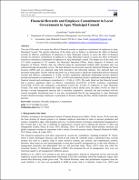Financial Rewards and Employee Commitment in Local Governments in Apac Municipal Council
Abstract
The aim of this study is to assess the effect of financial rewards on employee commitment of employees in Apac
Municipal Council. The specific objectives of the study were as follows: to determine the effect of financial
rewards on affective commitment of employees in Apac Municipal Council; to assess the effect of financial
rewards on normative commitment of employees in Apac Municipal Council; to assess the effect of financial
reward on continuance commitment of employees in Apac Municipal Council. The sample size of the study was
135 which comprised of 132 teachers, the Municipal Education Officer, Senior Inspector of Schools, and
Inspector of Schools. Primary data was collected using the questionnaire method while secondary data was
collected through documentary review. The data obtained was processed using the Statistical Package for Social
Sciences (SPSS) and was analysed using both descriptive and inferential statistics. The analysed data was
presented using tables. Results indicate that there was a fairly positive significant relationship between financial
rewards and affective commitment (r =0.506, p<0.05), moderately significant relationship between financial
rewards and normative commitment (r = 0.307, p<0.05) and moderately positive significant relationship between
financial rewards and continuance commitment (r = 0.346, p< 0.05). The study found out that financial reward
had a positive significant effect on affective commitment (Coef.0.513, p<0.05), normative commitment
(Coef.0.306, p<0.05) and continuance commitment (Coef.0.433, p<0.05) of employees in Apac Municipal
Council. The study recommended that Apac Municipal Council should carry out salary reviews in order to
develop a reward management structure that is externally competitive, internally fair and consistent with the
current acceptable international rates. It was also recommended that the top management in Apac Municipal
Council should encourage employees to participate in decision making and they should implement employees’
decision.
Collections
- Research Articles [29]

